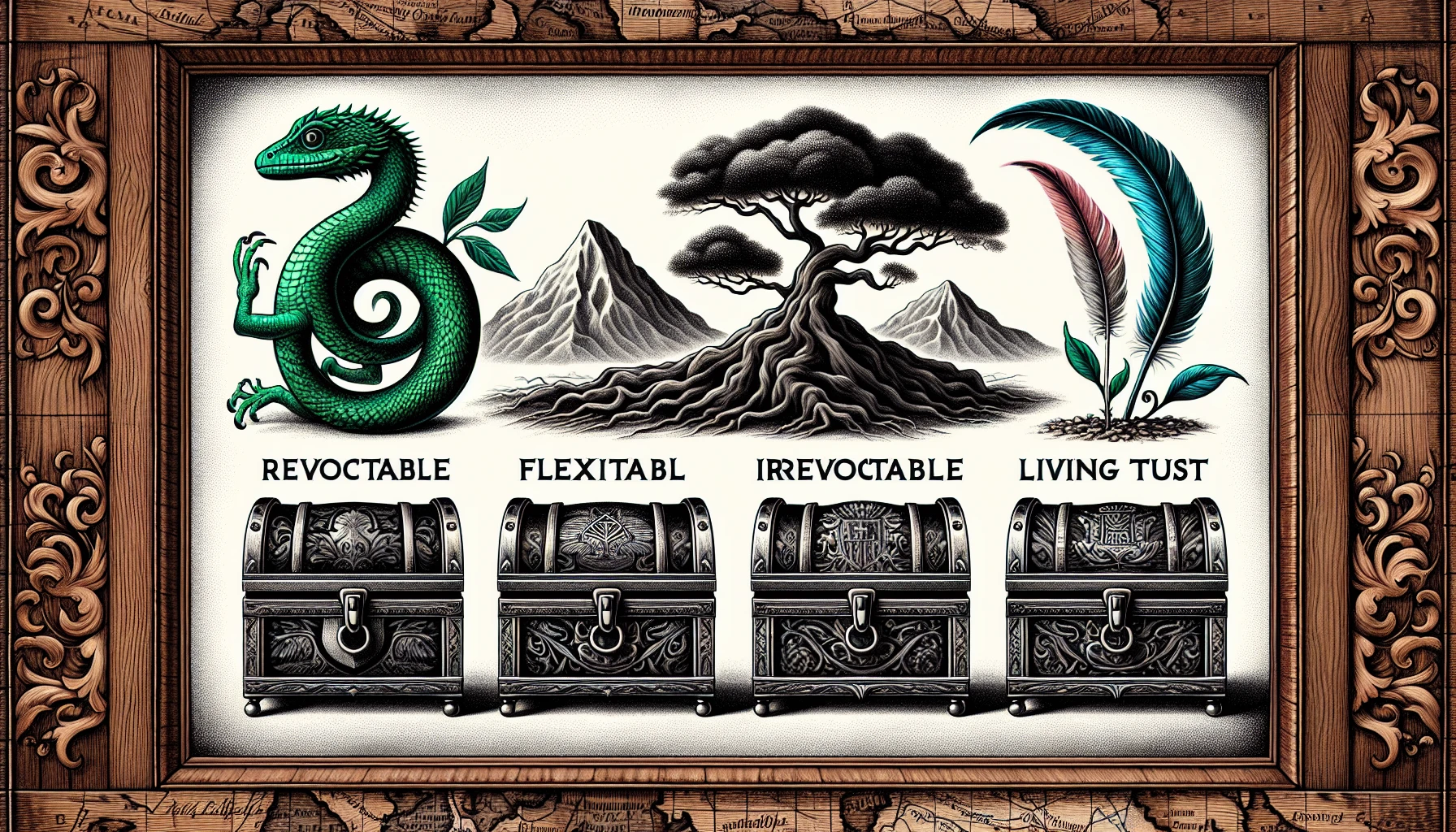Estate planning is a vital step in securing your family’s financial future, and a well-crafted trust can be the cornerstone of this process. Trusts offer a powerful way to safeguard your assets, minimize taxes, and ensure that your loved ones are provided for, even after your passing. Are you ready to take control of your estate planning journey and explore the world of trusts? Let’s embark on a comprehensive guide on how to create a trust, from understanding key elements and terminology to selecting the right type and seeking professional assistance.
Key Takeaways
- Understand the core elements and terminology of trusts for successful estate planning.
- Consider potential benefits such as asset protection, privacy, control over distribution and tax advantages when creating a trust.
- Seek professional assistance to ensure legal compliance and optimize benefits when establishing a trust.
Understanding Trusts: Key Elements and Terminology
A trust is a legal arrangement that ensures the assets of an individual are allocated to designated beneficiaries, and it can help minimize federal estate tax, if any. Trusts encompass a grantor, trustee, and beneficiaries, with assets held in a trust fund. Trust fund accounts can provide a variety of options for asset management and protection for beneficiaries. These include:
- Bank accounts
- Stocks and bonds
- Real estate
- Tangible personal property
- Digital assets
Trusts can provide for prompt distribution to those it is left for, and another benefit is that if done correctly, will avoid probate. The grantor is responsible for creating the trust and transferring assets into it. The trustee, on the other hand, is the organization or individual responsible for administering the trust, as outlined in the trust documents.
Typically, children are designated as beneficiaries in the trust’s language, but anyone else may be beneficiaries, including other family members, charities, friends, or anyone. Trusts serve a fundamental purpose in estate planning. They administer assets for the benefit of another person or persons and can help lower estate tax bills, can protect funds for beneficiaries, protect funds from the grantor’s liabilities in some cases, plan for blended families, plan for a beneficiaries disability,, plan for the grantor’s incapacity, and many other potential scenarios. Grasping the core elements and terminology of trusts is key to successful estate planning and making sound decisions about your financial future.
Reasons for Creating a Trust
Creating a trust can provide several benefits, such as:
- Asset protection
- Privacy
- Control over asset distribution
- Bypassing probate
- Potential tax benefits
Trusts allow you to stipulate how and when the beneficiary will acquire the inheritance, offering a level of control that other estate planning tools may lack. Trust funds can be created for various purposes, such as reserving assets for predetermined objectives like college education or retaining property for the offspring of first marriages. One of the most significant benefits of a trust is the ability to circumvent probate, which can save both time and money.
Moreover, using a trust can offer protection against possible litigation, insolvency, or marriage dissolution. Trusts can also be used to:
- Maintain the existing eligibility for public services or benefits for beneficiaries without having to deplete the value of an estate
- Provide for the financial needs of minor children or individuals with special needs
- Protect assets from creditors or lawsuits
- Facilitate the smooth transfer of assets to beneficiaries after death
With a myriad of advantages, it’s no wonder that individuals and families turn to trusts as a vital component of their comprehensive estate plan.
Types of Trusts: Choosing the Right One for You
Trusts come in various forms, including revocable, irrevocable, living, and testamentary, each serving different purposes and offering unique benefits. When determining trust needs, it is important to consider factors such as having a family member with a disability, the type of assets to be safeguarded, and potential tax implications. For instance, revocable trusts offer flexibility, whereas irrevocable trusts provide tax benefits and asset protection. Revocable trusts do not provide any tax advantages or protection from creditors, unlike an irrevocable trust. This means that the settlor/grantor in a revocable trust can make changes or dissolve the trust at any time..
Some common types of trusts include:
- Charitable trusts
- Education trusts
- Marital trusts
- Living trusts
- Special needs trusts
- Irrevocable family trusts
Each trust type serves a unique purpose and presents different benefits. Therefore, reviewing your personal situation and seeking advice from an estate planning attorney or financial expert to identify the best trust for you is necessary.
Steps to Set Up a Trust: A Comprehensive Guide
Setting up a trust involves drafting a trust document, appointing trustees and beneficiaries, and transferring assets to the trust, with each step requiring careful consideration and planning. Although establishing a trust can be complex, a well-crafted trust can provide invaluable benefits in terms of asset protection, control over asset distribution, and potential tax advantages.
Drafting the Trust Document
The first step in setting up a trust is drafting a trust agreement document. This involves:
- Outlining the terms, assets, beneficiaries, and trustee(s)
- Ensuring the document adheres to legal regulations
- Signing and notarizing the document (legal requirements may vary depending on the jurisdiction)
Consulting with an attorney to ensure compliance with your jurisdiction’s specific requirements is advisable to prevent possible future complications.
Appointing Trustees and Beneficiaries
When appointing trustees and beneficiaries, consider the trustworthiness, financial acumen, and familial relations of the individuals involved. The selection of a trustee is critical, as they are responsible for administering the trust assets and allocating them to the beneficiaries. It is advisable to consider a third-party entity, such as a bank, attorney, or professional fiduciary, when selecting a trustee to ensure impartiality and expertise.
Assessing the needs and financial situations of each person, spouse, family members, and other potential beneficiaries is key when selecting beneficiaries for a trust. Allocating assets should be based on this information to ensure fair and equitable distribution of funds. Also, take into account family dynamics and ensure that the trustee and beneficiaries can work together effectively in executing their trust administration duties. This can help prevent potential conflicts and ensure a smooth administration process.
Transferring Assets to the Trust
Transfer assets to a trust is a vital step in the process, as it ensures the protection and proper distribution of your assets according to the trust terms. The procedure for transferring assets into a family trust entails contacting each financial institution where accounts, policies, and/or assets are held to inquire about their particular process and necessary documentation. It is essential to promptly fund the trust, as this can protect the assets from potential risks and ensure the best interests of beneficiaries.
Evaluating the value, tax implications, and beneficiaries’ needs when choosing assets for a trust is important. Some factors to consider include:
- High-value assets may provide increased financial security and help reduce estate taxes when incorporated into a trust.
- Thoughtfully choosing and transferring assets to the trust can maximize benefits for your beneficiaries.
- This will ensure the successful implementation of your estate plan.
Costs and Considerations When Establishing a Trust
Setting up a trust can be expensive, and it might include extra charges for property transfer, ownership, and ongoing maintenance. However, the potential benefits of a trust in terms of asset protection, probate avoidance, control, and tax advantages will almost certainly outweigh the expenses. Consider the old adage “you can pay a little now, or a lot later.” It is important to carefully consider the costs and benefits of establishing a trust and weigh them against your specific financial situation and estate
Trust Management and Administration
In many cases, the initials trustee is the grantor themselves, which means very little changes in the management of trust assets. In a Revocable Trust, they retain complete control over the assets, in an Irrevocable Asset protection trust, while they still control the assets, there are some rules on distributions that may limit their access to certain assets- a good Estate Planning attorney can help plan to maximize protection and minimize the loss of control. After the grantor has passed or incapacitated, trust management and administration encompass the trustee’s duties in asset management, the simplicity or complexity of which can be planned for in the trust itself. Financial institutions may administer trusts through their trust departments, which provide standardized, cost-effective trust services. For individuals who need to manage banking and investments online, setting up trust fund accounts is usually possible. There are several reputable companies that provide this service directly online..
The trustee has multiple responsibilities when it comes to trust assets. These include:
- Supervising the trust assets
- Monitoring expenses
- Making sure the trust is properly conducted
- Accounting for and reporting on trust assets
- Preparing tax and regulatory filings
By carefully selecting and working with a capable trustee, you can ensure the proper management and administration of your trust, providing peace of mind for you and your beneficiaries.
Alternatives to Trusts for Estate Planning
Although trusts can be a potent estate planning instrument, alternative options, such as wills, custodial accounts, and education savings plans, are also worth considering. Each of these options has its own benefits and drawbacks, depending on your specific financial situation and estate planning objectives.
Custodial accounts, such as UGMA/UTMA accounts, are used to pass on assets to minors and sometimes for educational purposes but do not provide control over how the assets are used. Education savings plans, such as Coverdell ESAs and 529 college savings plans, can be employed for funding future educational expenses and offer tax advantages. It is essential to evaluate these alternatives and consult with an estate planning attorney or financial professional to determine the most suitable option for your unique circumstances.
Seeking Professional Assistance: When and How to Consult Experts
Given the complexity and potential traps in trust establishment, it’s important to seek advice from attorneys, financial advisors, or online services to optimize benefits and ensure legal compliance. These professionals can help you navigate the intricacies of trust creation, management, and administration, providing invaluable expertise and support throughout the process.
When selecting a trust attorney or financial advisor, it is crucial to choose a qualified professional with expertise in estate planning and knowledge of trust laws and regulations. Consulting a knowledgeable professional who understands your personal situation and has prior experience with trusts can help you make well-informed decisions and create a thorough estate plan that suits your needs and those of your beneficiaries. Contact our attorney at Steslicki and Ghannam PLC today.
Summary
Creating a trust can be a powerful and effective strategy for estate planning, providing asset protection, control over asset distribution, and potential tax advantages. Understanding the key elements, terminology, and various types of trusts is essential to making informed decisions about your financial future. Although establishing a trust can be complex and costly, the benefits often outweigh the expenses. Seeking professional assistance from attorneys, financial advisors, or online services can ensure proper trust creation, management, and administration, providing peace of mind for you and your loved ones. With a carefully crafted trust in place, you can focus on enjoying life, knowing that your family’s financial future is secure.
Frequently Asked Questions
How much money should you have to set up a trust?
You can set up a trust fund for as little as $100, plus additional fees. If you own real estate, or are planning for young children, there is really no number that makes it “worth it” to have a trust- the reduction of post-death complications, avoidance of probate and ability to provide protections and plans for your young children make it worth it even if the overall estate is small.
What are the three types of trust?
Trusts are legal instruments that provide the trustor with considerable control over their assets. There are three primary types of trusts: revocable, irrevocable and testamentary. Each type of trust has distinct features that allow for particular financial planning strategies to be put in place.
What assets should not be in a trust?
Retirement accounts, health savings accounts, life insurance policies, UTMA or UGMA accounts and vehicles should not be included in a living trust as they can trigger income tax or other legal consequences.
What are the main benefits of creating a trust?
Creating a trust offers important benefits such as asset protection, privacy, control over asset distribution, probate avoidance, and potential tax savings.














